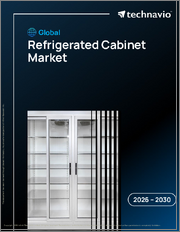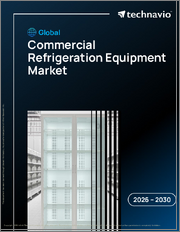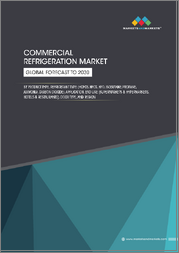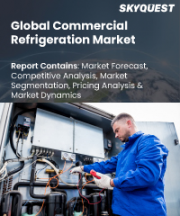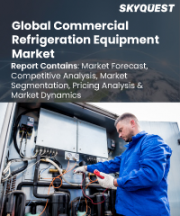
|
시장보고서
상품코드
1664877
냉동 시스템 시장 기회, 성장 촉진요인, 산업 동향 분석 및 예측(2024-2032년)Refrigeration System Market Opportunity, Growth Drivers, Industry Trend Analysis, and Forecast 2024 - 2032 |
||||||
세계의 냉동 시스템 시장은 2023년에 415억 달러로 평가되었고, 2024년부터 2032년에 걸쳐 4.6%의 안정된 CAGR로 성장할 것으로 예측되고 있습니다.
이 성장의 원동력이 되고 있는 것은 식품 및 음료, 의약품, 화학 등, 신뢰성이 높은 냉동이 제품 보존이나 규제 준수에 중요한 역할을 하는 주요 산업에 있어서 수요 증가입니다. 최첨단 기술의 발전과 에너지 효율적인 냉동 솔루션으로의 전환은 시장을 더욱 발전시키고 있습니다.

냉동 시스템 시장은 1차 부품과 보조 부품으로 구분됩니다. 2023년 1차 부품 부문은 280억 달러를 차지했으며 2032년까지 연평균 복합 성장률(CAGR) 4.7%로 성장할 것으로 예측됩니다. 이 부문의 주도적 위치는 효율적인 냉동 사이클을 보장하기 위해 압축기, 증발기 및 응축기가 필수적인 역할을 하기 때문입니다. 모든 냉동 시스템의 심장부인 컴프레서는 에너지 소비의 대부분을 차지하고 있으며, 성능 향상과 에너지 비용 절감을 위한 지속적인 기술 혁신에 박차를 가하고 있습니다. 한편, 증발기와 콘덴서는 열전달에서 매우 중요한 역할을 하며 일관된 온도 제어와 신뢰성 있는 시스템 성능을 보장합니다.
| 시장 범위 | |
|---|---|
| 시작 연도 | 2023년 |
| 예측 연도 | 2024-2032년 |
| 시작 금액 | 415억 달러 |
| 예측 금액 | 619억 달러 |
| CAGR | 4.6% |
냉장 유형에 따라 시장은 기존 시스템과 스마트 시스템으로 분류됩니다. 전통적인 냉동 시스템은 2023년에 66% 시장 점유율을 차지했으며, 2032년에는 404억 달러에 이를 것으로 예측됩니다. 보급의 원동력은 합리적인 가격과 낮은 유지 보수 요구 사항이며, 특히 비용에 민감한 시장에서 중소기업에게 선호되는 선택입니다. 다른 혜택으로 기존 시스템에는 확립된 공급망과 기술적 전문 지식이 있어 원활한 배포가 가능합니다. 기술 인프라가 개발되지 않은 지역에서는 스마트 냉동 기술이 아직 널리 보급되지 않을 수 있는 고급 프레임워크를 필요로 하기 때문에 이러한 시스템에 크게 의존합니다.
북미의 냉동 시스템 시장은 미국이 선도하고 있고, 2023년의 평가액은 85억 달러였으며, 2032년까지의 CAGR은 4.6%로 예상되고 있습니다. 미국 시장의 우위성은 제품의 품질과 엄격한 규제에 대응하기 위해 냉장을 우선하는 강력한 산업·상업 부문에 지지되고 있습니다. 이 나라의 확립된 콜드체인 네트워크, 엄격한 식품 안전 기준, 의약품 보관은 추가 성장 촉진요인입니다.
목차
제1장 조사 방법과 조사 범위
- 시장 범위와 정의
- 기본 추정과 계산
- 예측 계산
- 데이터 소스
- 1차
- 2차
- 유료 소스
- 공개 소스
제2장 주요 요약
제3장 업계 인사이트
- 업계 생태계 분석
- 밸류체인에 영향을 주는 요인
- 이익률 분석
- 방해
- 향후 전망
- 제조업체
- 유통업체
- 공급자의 상황
- 이익률 분석
- 주요 뉴스와 대처
- 규제 상황
- 영향요인
- 성장 촉진요인
- 높아지는 환경 규제와 지속가능성에의 대처
- 기술의 진보와 저GWP 냉매로의 시프트 증가
- 콜드체인 물류에 대한 수요 증가
- 업계의 잠재적 리스크·과제
- 높은 초기 투자 및 운영 비용
- 기술적 장애물과 안전성에 대한 배려
- 성장 촉진요인
- 기술 개요
- 성장 가능성 분석
- Porter's Five Forces 분석
- PESTEL 분석
제4장 경쟁 구도
- 서론
- 기업의 시장 점유율 분석
- 경쟁 포지셔닝 매트릭스
- 전략 전망 매트릭스
제5장 시장 추계·예측 : 구성 요소별(2021-2032년), 10억 달러
- 주요 동향
- 주요 부품
- 컴프레서
- 왕복동 컴프레서
- 스크류 컴프레서
- 원심식 컴프레서
- 스크롤 컴프레서
- 콘덴서
- 공랭식 콘덴서
- 수랭식 콘덴서
- 증발식 콘덴서
- 증발기
- 플레이트 증발기
- 튜브 증발기
- 핀형 증발기
- 제어 시스템
- 컴프레서
- 보조 구성 요소
- 솔레노이드 밸브
- 압력 조절기
- 고압 조절기
- 저압 조절기
- 필터
- 열교환기
- 판형 열교환기
- 쉘&튜브 열교환기
- 핀형 열교환기
- 팽창 밸브
- 기타
제6장 시장 추계·예측 : 냉동 카테고리별(2021-2032년), 10억 달러
- 주요 동향
- 스마트
- 기존
제7장 시장 추계·예측 : 용도별(2021-2032년), 10억 달러
- 주요 동향
- 상업
- 하이퍼마켓 및 슈퍼마켓/식품 소매업
- 접객
- 의료시설
- 기타(엔터테인먼트·레저, 꽃집 등)
- 산업
- 식품 및 음료 가공
- 화학제품 및 석유화학제품
- 제약
- 전자 및 기타 제조업
- 냉장 창고
- 에너지·유틸리티
- 기타(야금, 반도체 등)
- 운수
- 트럭 냉장
- 컨테이너 운송
- 해상선박
- 기타(항공우주 시스템, 철도 운송 등)
제8장 시장 추계·예측 : 사용자별(2021-2032년), 10억 달러
- 주요 동향
- OEM
- 건설업자
- 유통업체
제9장 시장 추계·예측 : 유통 채널별(2021-2032년), 10억 달러
- 주요 동향
- 직접 판매
- 간접 판매
제10장 시장 추계·예측 : 지역별(2021-2032년), 10억 달러
- 주요 동향
- 북미
- 미국
- 캐나다
- 유럽
- 독일
- 영국
- 프랑스
- 이탈리아
- 스페인
- 네덜란드
- 폴란드
- 포르투갈
- 러시아
- 덴마크
- 스웨덴
- 헝가리
- 기타 유럽
- 아시아태평양
- 중국
- 일본
- 인도
- 한국
- 호주
- 인도네시아
- 기타 아시아태평양
- 라틴아메리카
- 브라질
- 멕시코
- 기타 라틴아메리카
- 중동 및 아프리카
- 사우디아라비아
- 아랍에미리트(UAE)
- 남아프리카
- 기타 중동 및 아프리카
제11장 기업 프로파일
- BITZER Kühlmaschinenbau GmbH
- Carrier Global Corporation
- Daikin Industries Ltd.
- Danfoss A/S
- Dorin
- Embraco(Nidec Corporation)
- Emerson Electric Co.
- Frick India Limited
- GEA
- Grundfos
- Hitachi
- Hussmann Corporation
- Ingersoll-Rand, Plc.
- Johnson Controls
- Lennox International
- Tecumseh Products Company
The Global Refrigeration System Market was valued at USD 41.5 billion in 2023 and is projected to grow at a steady CAGR of 4.6% from 2024 to 2032. This growth is fueled by increasing demand across key industries such as food and beverage, pharmaceuticals, and chemicals, where reliable refrigeration plays a critical role in product preservation and regulatory compliance. Advancements in cutting-edge technologies and the shift toward energy-efficient refrigeration solutions are further driving the market forward.
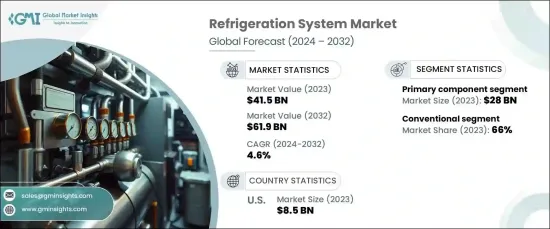
The refrigeration system market is segmented into primary and auxiliary components. In 2023, the primary component segment accounted for USD 28 billion and is forecasted to grow at a CAGR of 4.7% through 2032. This segment's leading position is attributed to the indispensable roles of compressors, evaporators, and condensers in ensuring efficient refrigeration cycles. Compressors, the heart of any refrigeration system, dominate energy consumption, spurring ongoing innovations to boost performance and reduce energy costs. Meanwhile, evaporators and condensers play a pivotal role in heat transfer, ensuring consistent temperature control and reliable system performance.
| Market Scope | |
|---|---|
| Start Year | 2023 |
| Forecast Year | 2024-2032 |
| Start Value | $41.5 Billion |
| Forecast Value | $61.9 Billion |
| CAGR | 4.6% |
Based on refrigeration type, the market is categorized into conventional and smart systems. Conventional refrigeration systems held a 66% market share in 2023 and are projected to reach USD 40.4 billion by 2032. Their widespread adoption is driven by affordability and low maintenance requirements, making them a preferred option for small and medium-sized enterprises, especially in cost-sensitive markets. Additionally, conventional systems benefit from established supply chains and technical expertise, enabling seamless implementation. Regions with underdeveloped technological infrastructure often rely heavily on these systems, as smart refrigeration technologies require advanced frameworks that may not yet be widely accessible.
The United States leads the refrigeration system market in North America, with a valuation of USD 8.5 billion in 2023 and an anticipated CAGR of 4.6% through 2032. The dominance of the U.S. market is underpinned by its strong industrial and commercial sectors, which prioritize refrigeration for product quality and compliance with stringent regulations. The country's well-established cold chain network, strict food safety standards, and pharmaceutical storage are additional growth drivers.
Table of Contents
Chapter 1 Methodology & Scope
- 1.1 Market scope & definitions
- 1.2 Base estimates & calculations
- 1.3 Forecast calculations
- 1.4 Data sources
- 1.4.1 Primary
- 1.4.2 Secondary
- 1.4.2.1 Paid sources
- 1.4.2.2 Public sources
Chapter 2 Executive Summary
- 2.1 Industry synopsis, 2021-2032
Chapter 3 Industry Insights
- 3.1 Industry ecosystem analysis
- 3.1.1 Factor affecting the value chain
- 3.1.2 Profit margin analysis
- 3.1.3 Disruptions
- 3.1.4 Future outlook
- 3.1.5 Manufacturers
- 3.1.6 Distributors
- 3.2 Supplier landscape
- 3.3 Profit margin analysis
- 3.4 Key news & initiatives
- 3.5 Regulatory landscape
- 3.6 Impact forces
- 3.6.1 Growth drivers
- 3.6.1.1 Growing environmental regulations and sustainability initiatives
- 3.6.1.2 Technological progress and increasing shift towards low-GWP refrigerants
- 3.6.1.3 Rising demand for cold chain logistics
- 3.6.2 Industry pitfalls & challenges
- 3.6.2.1 High initial investment and operational costs
- 3.6.2.2 Technical hurdles and safety considerations
- 3.6.1 Growth drivers
- 3.7 Technological overview
- 3.8 Growth potential analysis
- 3.9 Porter’s analysis
- 3.10 PESTEL analysis
Chapter 4 Competitive Landscape, 2023
- 4.1 Introduction
- 4.2 Company market share analysis
- 4.3 Competitive positioning matrix
- 4.4 Strategic outlook matrix
Chapter 5 Market Estimates & Forecast, By Component, 2021-2032 (USD Billion) (Thousand Units)
- 5.1 Key trends
- 5.2 Primary component
- 5.2.1 Compressors
- 5.2.1.1 Reciprocating compressors
- 5.2.1.2 Screw compressors
- 5.2.1.3 Centrifugal compressors
- 5.2.1.4 Scroll compressors
- 5.2.2 Condensers
- 5.2.2.1 Air-cooled condensers
- 5.2.2.2 Water-cooled condensers
- 5.2.2.3 Evaporative condensers
- 5.2.3 Evaporators
- 5.2.3.1 Plate evaporators
- 5.2.3.2 Tube evaporators
- 5.2.3.3 Finned evaporators
- 5.2.4 Control systems
- 5.2.1 Compressors
- 5.3 Auxiliary components
- 5.3.1 Solenoid valves
- 5.3.2 Pressure regulators
- 5.3.2.1 High-pressure regulators
- 5.3.2.2 Low-pressure regulators
- 5.3.3 Filters
- 5.3.4 Heat exchangers
- 5.3.4.1 Plate heat exchangers
- 5.3.4.2 Shell and tube heat exchangers
- 5.3.4.3 Finned heat exchangers
- 5.3.5 Expansion valves
- 5.3.6 Others
Chapter 6 Market Estimates & Forecast, By Refrigeration Category, 2021-2032 (USD Billion) (Thousand Units)
- 6.1 Key trends
- 6.2 Smart
- 6.3 Conventional
Chapter 7 Market Estimates & Forecast, By Application, 2021-2032 (USD Billion) (Thousand Units)
- 7.1 Key trends
- 7.2 Commercial
- 7.2.1 Hypermarket & supermarket /food retailers
- 7.2.2 Hospitality
- 7.2.3 Healthcare facilities
- 7.2.4 Others (entertainment & leisure, floral, etc.)
- 7.3 Industrial
- 7.3.1 Food & beverage processing
- 7.3.2 Chemical & petrochemical
- 7.3.3 Pharmaceutical
- 7.3.4 Electronics& other manufacturing
- 7.3.5 Cold storage warehouses
- 7.3.6 Energy & utility
- 7.3.7 Others (metallurgy, semiconductor, etc.)
- 7.4 Transportation
- 7.4.1 Truck refrigeration
- 7.4.2 Container shipping
- 7.4.3 Maritime vessels
- 7.4.4 Others (aerospace system, rail transport, etc.)
Chapter 8 Market Estimates & Forecast, By User, 2021-2032 (USD Billion) (Thousand Units)
- 8.1 Key trends
- 8.2 OEM
- 8.3 Constructer
- 8.4 Distributors
Chapter 9 Market Estimates & Forecast, By Distribution Channel, 2021-2032 (USD Billion) (Thousand Units)
- 9.1 Key trends
- 9.2 Direct sales
- 9.3 Indirect sales
Chapter 10 Market Estimates & Forecast, By Region, 2021-2032 (USD Billion) (Thousand Units)
- 10.1 Key trends
- 10.2 North America
- 10.2.1 U.S.
- 10.2.2 Canada
- 10.3 Europe
- 10.3.1 Germany
- 10.3.2 United Kingdom
- 10.3.3 France
- 10.3.4 Italy
- 10.3.5 Spain
- 10.3.6 Netherlands
- 10.3.7 Poland
- 10.3.8 Portugal
- 10.3.9 Russia
- 10.3.10 Denmark
- 10.3.11 Sweden
- 10.3.12 Hungary
- 10.3.13 Rest of Europe
- 10.4 Asia Pacific
- 10.4.1 China
- 10.4.2 Japan
- 10.4.3 India
- 10.4.4 South Korea
- 10.4.5 Australia
- 10.4.6 Indonesia
- 10.4.7 Rest of APAC
- 10.5 Latin America
- 10.5.1 Brazil
- 10.5.2 Mexico
- 10.5.3 Rest of Latin America
- 10.6 Middle East & Africa
- 10.6.1 Saudi Arabia
- 10.6.2 UAE
- 10.6.3 South Africa
- 10.6.4 Rest of MEA
Chapter 11 Company Profiles
- 11.1 BITZER Kühlmaschinenbau GmbH
- 11.2 Carrier Global Corporation
- 11.3 Daikin Industries Ltd.
- 11.4 Danfoss A/S
- 11.5 Dorin
- 11.6 Embraco (Nidec Corporation)
- 11.7 Emerson Electric Co.
- 11.8 Frick India Limited
- 11.9 GEA
- 11.10 Grundfos
- 11.11 Hitachi
- 11.12 Hussmann Corporation
- 11.13 Ingersoll-Rand, Plc.
- 11.14 Johnson Controls
- 11.15 Lennox International
- 11.16 Tecumseh Products Company






